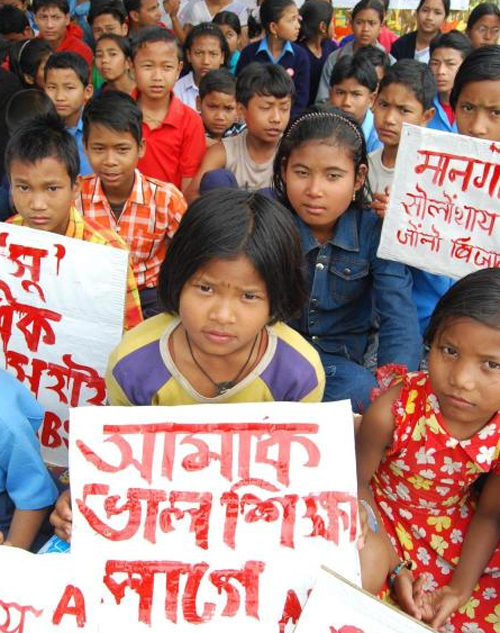The central government on Monday signed an accord with one of the insurgent groups of Assam—the National Democratic Front of Boroland (NDFB)—providing political and economic bonanza.
The All Bodo Students' Union (Absu), which has been spearheading a movement for a Bodoland state, was also a signatory to the accord.
The tripartite agreement was signed by Assam chief minister Sarbananda Sonowal, top leadership of the four factions of the NDFB, ABSU, joint secretary in the home ministry Satyendra Garg and Assam chief secretary Kumar Sanjay Krishna in presence of Union home minister Amit Shah.
'It is a historical accord,' Union home secretary Ajay Bhalla said and asserted that the pact will bring comprehensive solution to the Bodo issue.
After the lone outfit demanding a separate Bodoland state, NDFB (Saoraigwra), came overground on January 11 and decided to join the peace parleys, the Centre expedited the process of reaching an “ultimate” solution to the Bodo issue festering since the late eighties.
All stakeholders of the Bodoland movement, including four NDFB factions, representatives of All Bodo Students’ Union and People’s Joint Action Committee for Boroland Movement have been camping in Delhi. NDFB chief Ranjan Daimary, sentenced to life imprisonment for his involvement in the Oct 30, 2008, serial bomb blasts, also flew to Delhi on Saturday, after being released on bail, to take part in the talks.
The proposed treaty is going to be the third such settlement with the Bodo groups since 1993, when the memorandum of settlement (Bodo Accord) signed in Guwahati on February 20, paved the way for setting up the Bodoland Autonomous Council.
However, the accord allegedly did not meet the demands of the community and an armed movement for a separate Bodoland ensued. Ten years later, on February 10, 2003, the Assam government, the Centre and the Bodo Liberation Tigers (BLT) signed the memorandum of settlement to form the present Bodoland Territorial Council, which includes Kokrajhar, Chirang, Baksa and Udalguri districts. BPF, which runs the BTC, is the political avatar of the disbanded BLT.
Meanwhile, earlier in the day, a 12-hour Assam bandh was called by various non-Bodo organisations in protest against the Centre's move to sign a peace accord with different Bodo stakeholders. The bandh has brought life to a standstill in the four districts under the Bodoland Territorial Council (BTC).
Official sources told PTI that normal life has been affected in Kokrajhar, Baksa, Chirang and Udalguri districts—all part of the Bodoland Territorial Council. The bandh did not have any impact in other areas of the state.
Apart from burning of tyres in some areas in Kokrajhar district, no major incident of violence has been reported so far, police said.
All educational institutions remained closed though some examinations scheduled in the colleges were held.
Vehicles, including long-distance buses, remained off the roads and all shops and business establishments were shut.
Railway services remained unaffected so far with all major trains running on schedule, a Northeast Frontier Railway (NFR) spokesperson told PTI.
The bandh has been called by various organisations including the All Koch Rajbongshi Students' Union (AKRSU), All Bodo Minority Students' Union (ABMSU), All Adivasi Students' Union, Oboro Suraksha Samiti, Kalita Janagoshti Students' Union among others.
The non-Bodo organisations are demanding that all non-Bodo stakeholders residing in the Bodoland Territorial Administrative Districts (BTAD) and the banned Kamtapur Liberation Organisation (KLO) should be included in the peace talks and made signatories to the accord that was signed a few hours ago.
The Centre held discussions with the Bodo stakeholders, including four factions of the NDFB, All Bodo Students' Union (ABSU) and the People's Joint Action Committee for Boroland.
Assam minister Himanta Biswa Sarma had on Saturday said that the Centre has assured the state government that the areas under the BTAD will not be declared a Union Territory and no new areas will be added to it and that the state's territorial integrity will be maintained.










